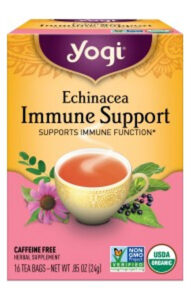Do you ever find yourself wondering how to fend off colds and flu as the days grow shorter and winter draws near?
With the chill in the air, it’s more important than ever to keep your immune system in top shape. While there are countless products on the market promising to boost your defences, natural remedies offer a gentler, yet effective approach.
These time-tested solutions can help you stay healthy during the colder months ahead.
There are some simple but powerful home remedies to strengthen your immune system, so you’re better prepared to tackle whatever winter throws your way. Let’s get started on boosting your health naturally, just in time for the festive season.
Understanding the Immune System
It’s critical to gear up with ways to fend off the seasonal blues like colds and the flu. Understanding and nurturing your immune system is essential in this defence. Let’s explore the integral parts of our body’s defence system, how they operate, and what signs indicate you might need to pay extra attention to your immune health.
If you want to skip to the practical part, click here!
What is the Immune System?
The immune system is a complex network of cells, tissues, and organs in our body that work collectively to fend off harmful invaders like germs and bacteria. Key players include:
- White Blood Cells (WBCs): Often referred to as the “army” of the body, WBCs patrol your bloodstream, looking for pathogens.
- Antibodies: These are special proteins that tag invaders for destruction.
- The Lymphatic System: This includes lymph nodes and vessels that transport white blood cells.
- Bone Marrow and Thymus: They produce and mature essential immune components.
Each part plays a crucial role in keeping you healthy. For a detailed explanation, you can refer to Cleveland Clinic’s comprehensive guide.
How the Immune System Works
Your immune system operates like a highly coordinated surveillance network. Upon detecting a foreign entity:
- Detection: The immune components identify the intruder.
- Response: WBCs and antibodies are deployed to the invasion site.
- Memory Creation: Once a pathogen is fought off, your body may create a memory of it, allowing for a faster response if encountered again.
Signs of a Weakened Immune System
- Frequent Colds: Catching colds more than 2-3 times a year could indicate a problem.
- Chronic Fatigue: Constant tiredness or exhaustion without clear cause.
- Digestive Issues: Signs such as persistent diarrhoea or constipation.
Pay attention to these signs and consider lifestyle changes or medical consultations if needed.
Keeping your immune system robust is not just about fending off disease; it’s key to maintaining a vibrant and healthy life.
Top Home Remedies for Immune Boosting
With winter approaching, keeping your immune system in check is more important than ever. While you can never completely dodge colds and flu, boosting your immunity can act like a shield against the winter bugs. Let’s explore some handy home remedies to give your immune system that much-needed boost.
Ginger Tea
Ginger is not just a cooking spice; it’s a powerhouse of goodness. Packed with antioxidants, ginger helps combat oxidative stress, which can harm immune function. To prepare a soothing cup of ginger tea:
- Slice fresh ginger – about one inch should do.
- Boil in water for 10-15 minutes.
- Add honey or lemon, if desired, for added flavour and wellness.
Sipping this golden brew can be an invigorating way to fortify your body’s defence system. Discover more about ginger’s benefits in this helpful article.
Garlic
Garlic is nature’s own antibiotic. Rich in allicin, it boosts the disease-fighting response of white blood cells. How do you incorporate garlic into your diet? Here are some ideas:
- Add minced garlic to soups or stews.
- Toss crushed garlic with vegetables before roasting.
- Use in salad dressings for a zingy kick.
Incorporating garlic into your meals is a flavourful way to enhance your body’s natural protection. Learn more about garlic’s immune benefits.
Honey and Lemon
Honey with lemon is a classic combo for soothing sore throats, but it does more than just that. Honey boasts antimicrobial properties, while lemon is loaded with vitamin C. Mixing them into warm water can:
- Soothe throat irritations.
- Provide a vitamin C boost.
- Serve as a sweet and tangy daily tonic.
These simple ingredients can be your allies in staying healthy through the chilly months. Discover more about the benefits of honey and lemon for immunity.
Turmeric Latte
Turmeric isn’t just for curries; it’s a potent anti-inflammatory agent. Making a turmeric latte, or “golden milk,” is straightforward:
- Combine milk with a teaspoon of turmeric powder.
- Add a pinch of black pepper – this helps your body absorb the turmeric.
- Sweeten with honey, if desired.
This warm, golden drink not only tastes delightful but also supports robust immune function. Check out the benefits of turmeric.
Herbal Infusions
 Herbal infusions can be wonderful companions during cold seasons. Consider these herbs:
Herbal infusions can be wonderful companions during cold seasons. Consider these herbs:
- Echinacea: Often used to reduce the duration of colds.
- Elderberry: Rich in antioxidants, known for boosting immunity.
- Chamomile: Known for its calming effects, also supports immunity.
There are many immune boosting infusions but my favorite is Yogi Echinacea!
Brewing infusions with these herbs can boost your immune system, a good habit to develop!
Dietary Considerations for Immune Support
Eating the right foods can strengthen your body’s defense system and keep you healthier during the colder months.
Vitamin C-Rich Foods

Vitamin C is like a superstar in the world of immune health. It’s known for boosting white blood cell production, which helps fight infections. But where can you find it? Here are some top sources:
- Citrus Fruits: Oranges and grapefruits are well-known for their Vitamin C content. Not only do they taste great, but they also give your immune system a hefty boost.
- Strawberries: These juicy berries are packed with Vitamin C and can offer more than just a sweet treat.
- Broccoli: This green veggie is a powerhouse of vitamins and minerals, including Vitamin C. It’s also rich in fibre.
Adding these foods to your diet can help maintain a strong immune system.
Zinc and Its Importance
Zinc is crucial for keeping your immune system in tip-top shape. It helps develop and activate cells that battle infections and contributes to wound healing. But where do you get zinc from? Consider these options:
- Meat and Shellfish: Foods like beef, pork, and oysters are rich in zinc. Although it might not be the most colourful food choice, it’s one of the best sources.
- Legumes: Lentils, beans, and chickpeas not only provide zinc but are also a great source of plant-based protein.
Keep these foods in your diet to ensure you’re getting enough of this important mineral. Low zinc can be tested for and supplemented if needed. Speak to your health professional if you think you might be low in Zinc.
Probiotic Foods
Your gut plays a significant role in maintaining your immunity. Probiotics, often known as “good bacteria,” aid in this process by supporting the health of your gut. Here’s how you can include them in your diet:
- Yogurt: A staple in many households, it’s one of the easiest ways to get your probiotics. Just make sure it says “live and active cultures” on the label.
- Kefir: This fermented milk drink is full of probiotics and might be a great alternative if you’re not keen on yogurt.
- Sauerkraut and Kimchi: These fermented vegetables are not only delicious but also provide a healthy dose of probiotics.
You can read more about the effects of gut health on immunity here.
Lifestyle Changes to Enhance Immunity
Regular Exercise
Physical activity is not just good for your heart and waistline; it’s a powerful way to boost your immunity as well. Regular exercise helps your immune system circulate essential cells and substances more efficiently, which helps ward off illness. When you move, your body increases circulation, making it easier for immune cells to travel and function effectively.
According to research from Healthline, moderate-intensity exercise can stimulate cellular immunity by increasing the circulation of immune cells.
This doesn’t mean you need to run a marathon; even a daily 30-minute walk can lead to improvements.
Adequate Sleep
Sleep is not just rest for the weary; it’s a critical component of a robust immune system. When you skimp on sleep, your body is less able to fight off infections. Sleep allows your body to produce proteins called cytokines that help combat inflammation and infection.
Getting less than seven hours regularly can make you three times more likely to catch a cold. So, tuck into bed a little earlier or take a power nap during the day. Quality sleep is a natural immunity booster.
Stress Management Techniques
Stress can take a toll on your immune system, making it easier for germs to sneak in. Managing your stress is key to keeping your immune system in top shape. Stress hormones like cortisol can dampen the body’s ability to fight off foreign invaders, which is why it’s important to keep stress in check.
Consider these simple ways to reduce stress:
- Deep Breathing: When you feel overwhelmed, take a few deep breaths. It can help reset your nervous system.
- Guided Meditation: Just a few minutes focusing on your breathing and clearing your mind can work wonders.
- Exercise Regularly: Not just for fitness, but also to beat stress.
For more tips, you can check out Mayo Clinic’s five stress management tips.
By making these lifestyle changes, you can help your immune system stay strong this winter.
Remember, every small step can make a big difference!
